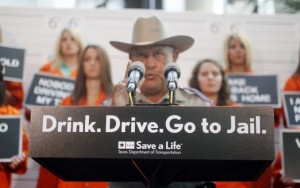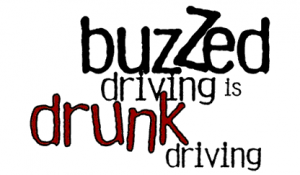3 Things to Know Now:
- “Drink. Drive. Go To Jail.” is not the law.
- Buzzed driving is NOT drunk driving.
- Do not tell the police anything about your alcohol or medicine consumption.
Drink. Drive. Go To Jail.
Although it has a catchy ring to it, it’s not the law.
The Texas Department of Transportation had (the website is no longer functional) a website that says, “If you’re drinking, don’t get behind the wheel and take a chance on being arrested or hurting yourself or someone else. Find a sober ride.”

There are a number of problems with the message on this site, but the first problem is that it insinuates that driving after drinking is illegal.
In fact, the law forbids you from driving while impaired, but does not forbid you from driving after having a drink without becoming impaired.
Bars have parking lots because society knows that people go there, socialize, and then go home. If driving after drinking were illegal, then wouldn’t bars simply have taxi stands or bus stations outside?
Another quote on this website says, “If an officer thinks your driving is impaired, you can be stopped and arrested for DWI regardless of your BAC.” While this statement is legally true, it leaves out a lot of information that you should know before you make a decision of whether to drive after having a drink socially.
Buzzed Driving is Drunk Driving.
Really?
In the early 1990’s the government began pushing the idea that if you feel “buzzed,” you are too impaired to drive. While this seems to make sense to some people, it fails both legally and scientifically. “Buzzed” is not a medical diagnosis. People generally have an idea of what being buzzed means to them. But, how do you know what it means to me, or the next person?

What one person considers buzzed may be a higher or lower level of intoxication than what another person considers being buzzed.
Instead of providing useful information, the government is making a blanket statement that if you feel something – anything – you are breaking the law.
This tactic of branding people as drunk drivers is useful for the government in two ways. First, if they can establish in your mind that you broke the law you are less likely to challenge your case in court.
People who genuinely believe in their innocence are far more likely to fight their case than those who believe they have some level of blame for being arrested.
By telling the public that “Buzzed Driving is Drunk Driving,” the government is putting an anchor in your mind that if you feel any effect from alcohol you are impaired.
Secondly, the government is putting an anchor in the minds of potential jurors that if you get arrested for drunk driving and admit to feeling any differently after drinking a drink or two that you were intoxicated. This, of course, makes it easier for the government to convict you for DWI.
Texas DWI Law
Texas DWI law does not say that if you feel any effect from alcohol you are guilty of DWI. In fact, you should only be convicted of DWI if you are impaired from drugs or alcohol while operating a motor vehicle.
Advice If You’re Stopped
Most Texas criminal defense attorneys tell you that if you get stopped and the officer begins asking you questions about how much you’ve had to drink, or whether you are taking any medications, you should politely refuse to answer the officer’s questions.
You are not required by law to admit taking medications or drinking when you are stopped. And, while it is legal for the police to lie to you, it is illegal for you to lie to the police.
Texas police officers are trained to ask you questions or give you commands in such a way as to get you to admit information that seems innocent enough to you at the time, but will be used to convict you in court. Anytime you admit drinking or taking medications, the District Attorney’s office will argue in court that you willfully broke the law.
By lowering the perception of what it takes to be impaired by medication or alcohol, the government lowers their burden of proof against you in a Texas DWI case. When the judge or jurors that hear the evidence against you believes the standard for impairment is low, they have an easier decision to make when it comes time to decide if you’re guilty.
Do not believe every advertisement you read – especially when it comes to Texas DWI laws. The government has proven time and again that they are willing to use lies, misstatements, and propaganda to influence your thinking, and the thinking of jurors.
When you admit to feeling any differently after having taken medication or drinking alcohol you give the government more ammunition to use against you in trial. Of course, the more ammunition they have, the more likely it is you will be convicted.







